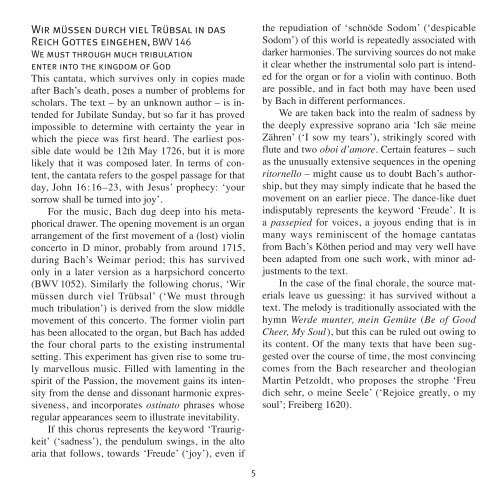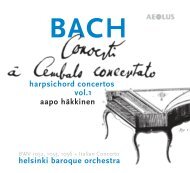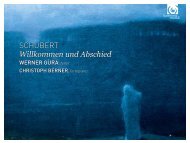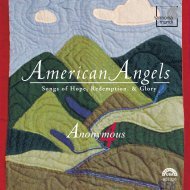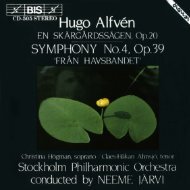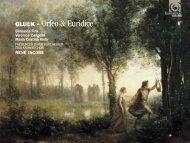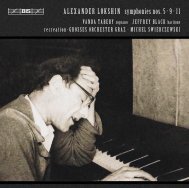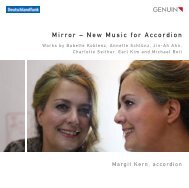Album booklet - eClassical
Album booklet - eClassical
Album booklet - eClassical
Create successful ePaper yourself
Turn your PDF publications into a flip-book with our unique Google optimized e-Paper software.
Wir müssen durch viel Trübsal in das<br />
Reich Gottes eingehen, BWV 146<br />
We must through much tribulation<br />
enter into the kingdom of God<br />
This cantata, which survives only in copies made<br />
after Bach’s death, poses a number of problems for<br />
scholars. The text – by an unknown author – is in -<br />
tended for Jubilate Sunday, but so far it has proved<br />
impossible to determine with certainty the year in<br />
which the piece was first heard. The ear liest pos -<br />
sible date would be 12th May 1726, but it is more<br />
likely that it was composed later. In terms of con -<br />
tent, the cantata refers to the gospel pas sage for that<br />
day, John 16:16–23, with Jesus’ prophecy: ‘your<br />
sorrow shall be turned into joy’.<br />
For the music, Bach dug deep into his meta -<br />
phorical drawer. The opening movement is an organ<br />
arrangement of the first movement of a (lost) violin<br />
concerto in D minor, probably from around 1715,<br />
during Bach’s Weimar period; this has survived<br />
only in a later version as a harpsi chord concerto<br />
(BWV 1052). Similarly the fol low ing chorus, ‘Wir<br />
müssen durch viel Trübsal’ (‘We must through<br />
much tribulation’) is derived from the slow middle<br />
movement of this concerto. The former violin part<br />
has been allocated to the organ, but Bach has added<br />
the four choral parts to the existing instrumental<br />
set ting. This experiment has given rise to some tru -<br />
ly marvellous music. Filled with lamenting in the<br />
spirit of the Passion, the movement gains its in ten -<br />
sity from the dense and dissonant harmonic ex pres -<br />
siveness, and incorporates ostinato phrases whose<br />
reg ular appearances seem to illustrate inevita bility.<br />
If this chorus represents the keyword ‘Trau rig -<br />
keit’ (‘sadness’), the pendulum swings, in the alto<br />
aria that follows, towards ‘Freude’ (‘joy’), even if<br />
5<br />
the repudiation of ‘schnöde Sodom’ (‘despicable<br />
Sodom’) of this world is repeatedly associated with<br />
darker harmonies. The surviving sources do not make<br />
it clear whether the instrumental solo part is intend -<br />
ed for the organ or for a violin with continuo. Both<br />
are possible, and in fact both may have been used<br />
by Bach in different performances.<br />
We are taken back into the realm of sadness by<br />
the deeply expressive soprano aria ‘Ich säe meine<br />
Zähren’ (‘I sow my tears’), strikingly scored with<br />
flute and two oboi d’amore. Certain features – such<br />
as the unusually extensive sequences in the opening<br />
ritornello – might cause us to doubt Bach’s author -<br />
ship, but they may simply indicate that he based the<br />
movement on an earlier piece. The dance-like duet<br />
indisputably represents the keyword ‘Freude’. It is<br />
a passepied for voices, a joyous ending that is in<br />
many ways reminiscent of the homage cantatas<br />
from Bach’s Köthen period and may very well have<br />
been adapted from one such work, with minor ad -<br />
justments to the text.<br />
In the case of the final chorale, the source mat -<br />
erials leave us guessing: it has survived with out a<br />
text. The melody is traditionally associated with the<br />
hymn Werde munter, mein Gemüte (Be of Good<br />
Cheer, My Soul), but this can be ruled out owing to<br />
its content. Of the many texts that have been sug -<br />
gested over the course of time, the most convincing<br />
comes from the Bach researcher and theologian<br />
Mar tin Petzoldt, who proposes the strophe ‘Freu<br />
dich sehr, o meine Seele’ (‘Rejoice great ly, o my<br />
soul’; Freiberg 1620).


